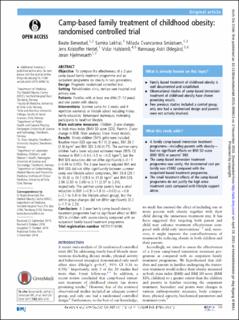| dc.contributor.author | Benestad, Beate | |
| dc.contributor.author | Lekhal, Samira | |
| dc.contributor.author | Småstuen, Milada C | |
| dc.contributor.author | Hertel, Jens Kristoffer | |
| dc.contributor.author | Halsteinli, Vidar | |
| dc.contributor.author | Ødegård, Rønnaug Astri | |
| dc.contributor.author | Hjelmesæth, Jøran | |
| dc.date.accessioned | 2021-04-28T07:37:24Z | |
| dc.date.available | 2021-04-28T07:37:24Z | |
| dc.date.created | 2016-11-09T08:51:25Z | |
| dc.date.issued | 2017 | |
| dc.identifier.citation | Archives of Disease in Childhood. 2017, 102 (4), 303-310. | en_US |
| dc.identifier.issn | 0003-9888 | |
| dc.identifier.uri | https://hdl.handle.net/11250/2740046 | |
| dc.description.abstract | Objective To compare the effectiveness of a 2-year camp-based family treatment programme and an outpatient programme on obesity in two generations.
Design Pragmatic randomised controlled trial.
Setting Rehabilitation clinic, tertiary care hospital and primary care.
Patients Families with at least one child (7–12 years) and one parent with obesity.
Interventions Summer camp for 2 weeks and 4 repetition weekends or lifestyle school including 4 days family education. Behavioural techniques motivating participants to healthier lifestyle.
Main outcome measures Children: 2-year changes in body mass index (BMI) SD score (SDS). Parents: 2-year change in BMI. Main analyses: linear mixed models.
Results Ninety children (50% girls) were included. Baseline mean (SD) age was 9.7 (1.2) years, BMI 28.7 (3.9) kg/m2 and BMI SDS 3.46 (0.75). The summer-camp children had a lower adjusted estimated mean (95% CI) increase in BMI (−0.8 (−3.5 to −0.2) kg/m2), but the BMI SDS reductions did not differ significantly (−0.11 (−0.49 to 0.05)). The 2-year baseline adjusted BMI and BMI SDS did not differ significantly between summer-camp and lifestyle-school completers, BMI 29.8 (29.1 to 30.6) vs 30.7 (29.8 to 31.6) kg/m2 and BMI SDS 2.96 (2.85 to 3.08) vs 3.11 (2.97 to 3.24), respectively. The summer-camp parents had a small reduction in BMI (−0.9 (−1.8 to −0.03) vs −0.8 (−2.1 to 0.4) in the lifestyle-school group), but the within-group changes did not differ significantly (0.3 (−1.7 to 2.2)).
Conclusions A 2-year family camp-based obesity treatment programme had no significant effect on BMI SDS in children with severe obesity compared with an outpatient family-based treatment programme. | en_US |
| dc.language.iso | eng | en_US |
| dc.publisher | BMJ Publishing Group Ltd. | en_US |
| dc.relation.uri | https://www.ncbi.nlm.nih.gov/pubmed/27806969 | |
| dc.rights | Navngivelse-Ikkekommersiell 4.0 Internasjonal | * |
| dc.rights.uri | http://creativecommons.org/licenses/by-nc/4.0/deed.no | * |
| dc.title | Camp-based family treatment of childhood obesity: randomised controlled trial | en_US |
| dc.type | Peer reviewed | en_US |
| dc.type | Journal article | en_US |
| dc.description.version | publishedVersion | en_US |
| dc.source.pagenumber | 303-310 | en_US |
| dc.source.volume | 102 | en_US |
| dc.source.journal | Archives of Disease in Childhood | en_US |
| dc.source.issue | 4 | en_US |
| dc.identifier.doi | 10.1136/archdischild-2015-309813 | |
| dc.identifier.cristin | 1398608 | |
| dc.relation.project | Helse Sør-Øst RHF: 352016 | en_US |
| dc.description.localcode | This is an Open Access article distributed in accordance with the Creative Commons Attribution Non Commercial (CC BY-NC 4.0) license, which permits others to distribute, remix, adapt, build upon this work non-commercially, and license their derivative works on different terms, provided the original work is properly cited and the use is non-commercial. See: http://creativecommons.org/licenses/by-nc/4.0/ | en_US |
| cristin.ispublished | true | |
| cristin.fulltext | original | |
| cristin.qualitycode | 2 | |

